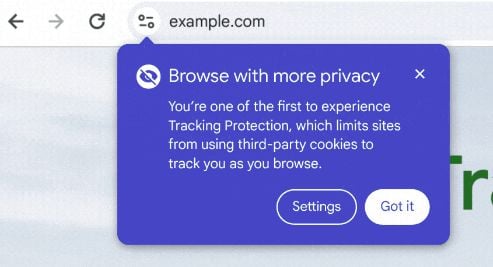The day has come, with Google activating the first stage of its cookie-removal strategy today.
Last month, Google finally confirmed when it would begin removing tracking cookies for some users.
As per Google:
“On January 4, we’ll begin testing Tracking Protection, a new feature that limits cross-site tracking by restricting website access to third-party cookies by default. We’ll roll this out to 1% of Chrome users globally, a key milestone in our Privacy Sandbox initiative to phase out third-party cookies for everyone in the second half of 2024, subject to addressing any remaining competition concerns from the UK’s Competition and Markets Authority.”
It doesn’t sound like a lot in percentage terms, but 1% of Chrome users is actually 30 million people. So a lot of users will be migrated to Google’s more privacy-friendly data tracking process from today, which will mark a big change in web tracking for advertisers.
Chrome users in the test will see this new notification when they open the app:
The impact of Google removing tracking cookies will be significant, with cookies traditionally providing key insights that help power the internet’s targeted ad system. Google’s replacement will instead see users categorized into topic listings, in an anonymized way, so brands will still be able to show their ads to subsets of users, but they won’t be able to utilize granular targeting based on the specifics of what people have engaged with across different websites.
Which will likely lead to worse-performing campaigns, meaning less money for web publishers, and a lesser web experience overall for users, via more generalized ads. At the same time, it’ll also increase the costs of ad targeting for many businesses.
Nevertheless, Google’s determined to push forward with its data privacy initiative, which will force more marketers into a new phase of trial and error to understand how to best utilize Google’s Sandbox tools to maximize effectiveness.
It’ll take a while to see real impact for most, but today marks a significant moment in this shift.
More data control is important, no doubt, but the changes at Google, as well as broader shifts at Apple, and via EU regulation, also take things too far in some respects, moving from optional filters to broad-scale changes.
But this is the way that the web is headed, and Google has been working towards this for years.
Now we wait and see the impacts, but once again, 2024 will be a year of major shifts for digital marketers.
Google aims to phase out all cookie tracking by the end of the year.



